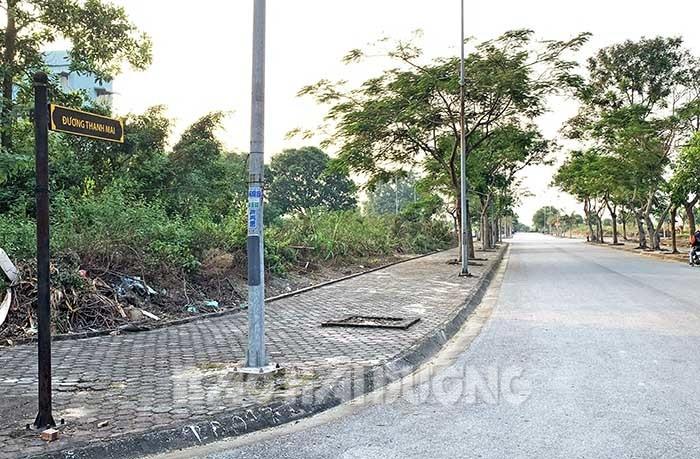The draft Law on Real Estate Business (amended) and the Law on Land (amended) both agree to propose not to allow the subdivision and sale of land in wards of urban areas and urban development planning areas.

Land trading is likened to "selling unripe rice", causing land speculation (illustrative photo)
If this proposal is approved, the subdivision and sale of land can only be carried out in communes and towns where there is no urban development plan. The form of land trading will therefore be prevented.
Tighten "selling green rice"
On December 28, 2022, the Ministry of Construction submitted to the Ministry of Justice a draft of the Law on Real Estate Business (amended) for appraisal. A notable new point compared to the draft for comments in September 2022 is that the drafting agency has revised the regulations on transferring land use rights to individuals who build their own houses (commonly known as dividing plots, selling plots; or trading in land plots) in the direction of stricter management.
Specifically, Article 32 of the draft has very strict regulations on the conditions for transferring land use rights to individuals who build their own houses. The conditions include: “Not located in the wards of urban areas and urban development planning areas; areas with high requirements for landscape architecture, central areas and around works that are architectural highlights in urban areas; frontage of regional-level roads and above and main landscape roads in urban areas”; “Belonging to the area for transferring land use rights with completed investment in technical infrastructure for individuals who build their own houses as announced by the provincial People's Committee”; “Must have completed investment in technical infrastructure according to the schedule, design, detailed planning or master plan and content of the approved project”.
Article 33 of the draft also requires investors when transferring land use rights in the form of subdivision and sale of land to fulfill financial obligations regarding the project's land, including land use fees, land rent; taxes, fees, and charges related to land...
The regulations in the latest draft are stricter than the draft of September 2022 (only excluding subdivision and sale of land in wards of special-class urban areas and class I urban areas directly under the Central Government; areas with high requirements for landscape architecture, central areas and around works that are architectural highlights in urban areas; frontage of regional-level roads and above and main landscape roads in urban areas).
Thus, the draft Law on Real Estate Business (amended) has been revised by the drafting agency to be consistent with the draft Law on Land (amended).
Article 53 of the draft Land Law (amended) which is being consulted by the people also stipulates that land use rights cannot be transferred in the form of subdivision and sale of land in urban areas and urban development planning areas.
Blocking the “Alibaba”
As mentioned, the draft Law on Real Estate Business (amended) also sets out the condition that projects that are divided into lots and sold must be located in areas that are divided into lots and sold by the provincial People's Committee. This provision will create a new administrative procedure of publishing maps of locations and areas that are divided into lots and sold, and when the provincial People's Committee has not announced it, projects cannot trade in land and investors must build houses for sale (at least rough construction, exterior finishing).
The fact that the latest draft of the Law on Real Estate Business (amended) stipulates very strict conditions and areas for subdivision and sale of land compared to the draft posted for comments 3 months ago may stem from the context of the Alibaba trial, when the issue of subdivision and sale of land became a headache.
Land trading has always been controversial in public opinion. Opposing opinions say that this is a form of “selling unripe rice”, which is only suitable for incompetent investors, causing land speculation, wasting land resources, and leaving land fallow. However, this is still a popular real estate investment method, especially for non-professional individual investors.
According to current law, the conditions for transferring land use rights in projects in the form of subdivision and sale of land are stipulated in Article 194 of the 2013 Land Law, specifically stipulated in Article 41 of Decree No. 43/2014/ND-CP and amended by Decree No. 148/2020/ND-CP.
Accordingly, current law only prevents the subdivision and sale of land in wards of special-class urban areas and class I urban areas directly under the Central Government; areas with high requirements for landscape architecture, central areas and around works that are architectural highlights in urban areas; frontages of regional-level roads and above and main landscape roads in urban areas.
Now, with the proposed amendments to the draft Land Law as well as the Law on Real Estate Business, the form of dividing plots and selling land will be managed more strictly; it can have a great impact on real estate speculators as well as businesses with strengths in developing land in the suburbs of small cities.
However, if the two draft laws are passed as proposed, in the long term, it will have a significant impact on making the real estate market more professional, with businesses focusing on the investment segment of creating houses and constructions on land instead of just investing in infrastructure and "selling unripe rice". At the same time, it will help land to be used more economically and effectively; overcoming the situation of "land speculation, slow land use, and abandoned land". This policy is also expected to contribute to "screening" investors, forming more professional and capable real estate businesses after businesses with limited financial capacity and technical capacity are eliminated by the market.
NGUYEN VAN DINH